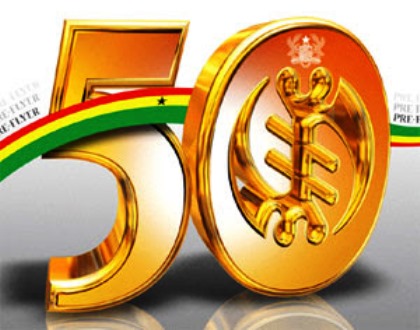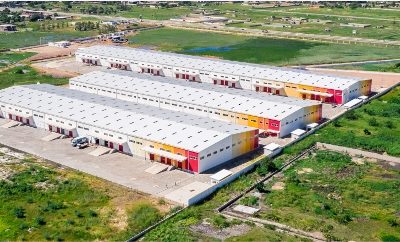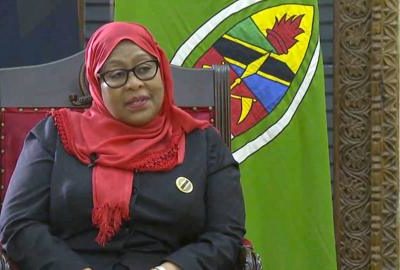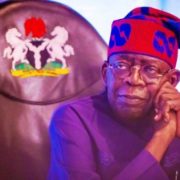SPECIAL REPORT. By SEGUN ORUAME
Ghana is 50.
Fifty years of tumultuous political landscape, violent change of power, serious economic descend, loss of faith in the state, and then a return to hope and recovery. From being one of the worst places to live in the 80s, when its economic woes peaked, Ghana has emerged to become one of the top economic performers in Sub-Saharan Africa.
It is increasingly becoming some sort of model in political stability and fiscal discipline. Its achievement would be more appreciated against the background of an African continent where corruption within public and private sectors have completely distorted the business climate; where there are more guns than bread; and more landmines have been laid in the past 50 years than phone lines.
It is not for nothing that Ghana is taking its rightful place again. A place it deserves by virtue of its history and importance to the continent. Ghana brought the struggle for a politically free continent to international discourse and capped it in 1957 by becoming the first Black nation to gain political independence.
Ghana re-enacted the African renaissance spirit under a political leadership provided by stateman and foremost African visionary Kwame Nkrumah. Under Nkrumah, Ghana inspired the rest of Africa to seek political independence and strive for a continent that would re-build itself from the ruins of centuries of slavery and colonialism.
From the clear vision of the 50s and the initial signs of progress in the early 60s, Ghana was soon to plunge into a political abyss and then the recession followed. It is instructive that Ghana’s fall was as much symbolic of the continent’s tragic collapse as it was of the complete decapitation of a continent that held so much hope for growth the years immediately before and after independence.
While countries of other continents have been able to remove the vestiges of foreign rule and successfully live through a new agenda for growth. Africa has sunk further. As the World Bank statistics show: in the past 25 years, 500 million have escaped poverty- most of them in the two big emerging economies of India and China. In the next decade, another 400 million worldwide are expected to follow in their footsteps but not from Africa.
According to the President of the World Bank Paul Wolfowitz during Ghana’s Golden Jubilee, “the one continent that has been left behind by the promise of change is Sub-Saharan Africa. The number of poor in Sub-Saharan Africa nearly doubled from roughly 160 million 25 years ago to 300 million today”. On an optimistic note, the continent is beginning to have some bright spots again. About 17 African countries notably Ghana with roughly a third of the population of the subcontinent have consistently an increased growth at 4%. A 4% growth may appear insignificant but for a continent much of which has posted negative growth in the last four decades, 4% in 17 of its 53 countries is simply a miracle.
More significantly, Ghana is leading this growth perhaps to underscore its importance on the continent and take its historical leadership position as an instigator of change. At 50, Ghana has reasons to roll out the drums. It has become one of the best performers economically in Sub-Saharan Africa. A sustained real growth of 4% in more than 10 years peaked at 6% in 2006, and Ghana is one of the few African countries expected to meet the Millennium Development Goal to cut poverty in half by 2015.
It is noteworthy that in the early 1990s, more than half of the population of Ghana was struggling to survive on less than $1 a day implying a state of extreme poverty.

Ghana @ 50: Strong with the wind
By SEGUN ORUAME
Ghana made history in March 6, 1957. It gained political independence as the first Black African country to do so and set the tone for the political liberation of the rest of the continent. By 1960, three years after its own independence, more than half of the continent had gained independence from their colonial masters including neighbouring Nigeria. The fiery call for political independence championed by Ghana under the visionary Kwame Nkrumah had yielded delightful results.
As Ghana’s first President, Nkrumah had envisioned a country with a continent totally free from colonial dominance and able to assert itself economically. Nkrumah saw Ghana as a country initiating its first steps towards freedom to a ship that was facing the high seas. His words “As I proudly stand on the bridge of that lone vessel as she confidently set sail, I raise a hand to shade my eyes from the glaring African sun, and to scan the horizon. There is so much more beyond”.
But as many of the independent countries were to realize, political liberation does not automatically result into economic self-sufficiency. In fact, as history and contemporary realities have shown, the post independent years came with economic blight, violent conflicts and complete pauperization of the continent. Most of Africa got entrapped in political uprising, lost its once bright economic prospect with the best of the continent’s plunging deep down from as high as USD$800 in the early 60s to as low as USD$50 in the mid-80s to early 90s. It was not until the mid-90s that some countries particularly Ghana started showing strong signs of recovery.
The World Bank’s President Paul Wolfowitz succinctly captured it thus at the 50th Anniversary celebration in Accra “I think if we are honest with ourselves, we would say that Ghana’s economic performance in the first years was disappointing and not what the people here wanted, but I am very pleased that in the last 10 years or so, Ghana has become one of the stronger performing African economies. It has come about; I think, through attention to human development, through attention to good, sound economic policy”.
Ghana currently ranks as one of the best-performing economies in Africa. By improving policies and institutions, and investing in infrastructure and basic services, Ghana has brought down poverty levels. Economic growth accelerated to six percent in 2005. With the gains of fiscal discipline and liberalization of once state-controlled entities beginning to show, Ghana looks set to achieve middle-income country status by 2015.
“When we met in Washington with President Kufor, we talked about the business environment here in Ghana. And last year- we measure every year how countries are performing in terms of the environment for doing business- Ghana was one of the 10 countries that made the greatest improvement. So, I believe, all of that is very good news. The other side of this coin is I do not believe you think that is good enough. We do not think that is good enough. We want to see Ghana really reach into the levels of the best performing countries in the world. That’s possible; you have got the energy and your people; you’ve got the creative talent.
“I think you know the kinds of policies that need to be undertaken to make those changes and we know the kind of help that you need from the World Bank and from the world community. Part of our job is to try to make sure that you have the resources to build the roads and power plants that your businesses need to grow and create jobs. You have got the challenge of building an environment where they can do that successfully”, added Wolfowitz hinting at a flipside to Ghana’s struggle for real economic growth.
Part of the flipside is expressed by the CEO of Contract Management Specialists, Ghana Ltd Godfrey Ewool in an interview with a World Bank team. His words: “There is tangible improvement in the macroeconomic environment (….) On the other hand; there is a substantial increase in national population coupled with a fast-growing incidence of urbanization, with the attendant negative effects of crime, poor waste management and inadequate utility services. These pose great challenges”.
There is also the need for government to ensure that its course of action for ICT development go beyond rhetoric with adequate steps at concretizing what has been inked as official policy, said Columbus Bruce, Accra base technology analyst and CEO of CuttingEgde Ghana Limited “Government is doing a lot. Government is promoting the PPP public private partnership. I think they have really understood the efforts behind PPP and I think the commitment is really there to ensure we derive full benefits but implementation is slow and that is the problem”, said Bruce in an exclusive with IT Edge inside Accra.
ICT providing additional growth for Ghana
Ghana’s information Communication Technology (ICT) sector has registered one of the most significant growth rates in Africa.
The Government of Ghana’s (GoG) proactive policy and regulatory interventions, combined with support from the World Bank Group and other development partners, has resulted in a competitive and vibrant industry, with more than USD157 million private investment in the sector between 2000 and 2005 (Source: PPI Database).
This has translated into a telephone penetration rate of over 22 percent in 2006 (from less than 3 percent in 2003), a 50 percent decrease in local and international call rates, and a threefold reduction in internet access prices from USD3 to US$1/hr.
The impact of these developments on economic growth and social transformation in the country has been equally significant. The telecommunications sector’s contribution to GDP more than tripled from 1.8 percent in 2000 to 6 percent in 2005. Additionally, ICT is being used to deliver better and more efficient services for government, citizens and business uses, and is fostering transparency and accountability in public and private transactions.
BusyInternet is the biggest internet café in Africa, with a sitting capacity of more than 100 people at a time. It has gained a reputation, locally and internationally, as a champion of innovation in ICT enabled services, including call centre services. Over the past two years, BusyInternet has been implementing an incubator service sponsored by the Bank’s InfoDev.
This is central to the Government of Ghana’s governance agenda; and it is already paying off for Government. A GoG/ World Bank investment of approximately USD1m and private investment of about USD4m in a customs modernization program has already led to about 50 percent increase in customs revenue, and a reduction in processing time from 2-3 weeks to 1-2 days within the first 18 months of project implementation.
Mobile phones have become a major form of communication for the country’s rural farmers, medical professionals and micro businesses to access market information, provide critical services and transact business.
Fishermen in Moree, a small town in Central Region, about 200kms from the capital city, are using mobile phones to ensure safety at sea and to confirm and compare fish prices in various markets.
A number of Banks in Ghana are also extending the reach of the formal financial and other services through mobile phones. The recent launching of Tradenet, an internet facility owned by Busy Lab that allows farmers in agricultural commodities in Africa to transact business through the use of mobile phone Short Message Service (SMS), is expected to further expand access to international markets for Ghana’s farmers. Entrepreneurs are increasingly using the internet to access information and markets, register businesses, and improve business operations.
The ICT sector has been a key source of employment in Ghana. Direct and indirect employment by telecommunications companies continues to increase, and the country’s young IT-enabled services industry, is already providing direct employment for some 2,500 people.
The World Bank financed eGhana Project ($US40m), in collaboration with info Dev. and FIAS, is building on these successes, and providing additional support for further harnessing Ghana’s competitiveness in the IT-enabled services industry, including for business process outsourcing (BPO), and improving service delivery through e-Government.
Research conducted by Hewitt Associates on behalf of the Government of Ghana highlights the BPO sector’s potential to create some 37,000 direct jobs and close to 150,000 indirect jobs, and to generate revenues of approximately $US750 million within a five-year period. Ghana has been recognized as an attractive destination for BPO and was ranked No.1 destination in SSA (ahead of South Africa) and No.22 globally out of 40 countries by AT Kearney Global Services Location Index (Nov. 2005).
The Government of Ghana, through its ICT4D policy (ICT for Accelerated Development), has confirmed its commitment to ICT-led socio-economic growth and expects the sector to contribute significantly to its efforts to achieve middle income status. The impressive growth and impact, however, mask significant sector challenges including high communications infrastructure prices (compared to competitor countries in the BPO business such as India), poor quality of connectivity, and uneven access to infrastructure and services in the country.
Several reasons account for the high prices and relatively poor quality of ICT services, including the lack of a robust domestic backbone infrastructure and inadequate regulatory instruments and capacity to proactively regulate the sector.
During his visit in March 2006, World Bank President Paul Wolfowitz reviewed the business environment in Ghana, including the ICT sector. He emphasized the need for more conducive environment for private sector development, in particular for businesses that use ICT, reiterated the World Bank Group’s commitment to supporting the government’s efforts.
Mr. Wolfowitz visited BusyInternet, one of the largest privately owned and operated ICT centers in Ghana, which has received an InfoDev grant to develop its business incubator that supports small ICT-enabled businesses in Ghana.































